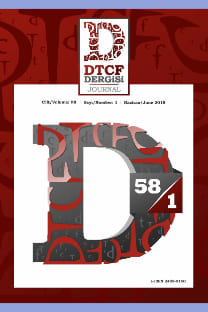DIDIER DAENINCKX'İN “LA MORT N'OUBLIE PERSONNE” 1 BAŞLIKLI ROMANINDA İŞGAL, DİRENİŞ VE ADALET
OCCUPATION, RESISTANCE AND JUSTICE IN DIDIER DAENINCKX'S NOVEL “LA MORT N'OUBLIE PERSONNE”
___
Azéma, Jean-Pierre ve Olivier Wieviorka. Vichy 1940-1944. Paris: Perrin, 1997.Barel, Efrat ve diğerleri. “Surviving the Holocaust: A Meta-analysis of the Long-term sequelae of a Genocide.” Psychological Bulletin 136.5 (2010): 677-98.
Bergeron, Serge. "L’évolution du roman policier." Québec Français 72 (December 1988): 71–73. Web: 11 Mart 2020
Daeninckx, Didier. La Mort N' Oublie Personne. Paris: Denoël, 1989. Daeninckx, Didier ve Thierry Maricourt. Daeninckx Par Daeninckx. Paris: Cherche midi, 2009.
Forsdick, Charles. “‘Direction Les Oubliettes de l’histoire’: Witnessing the Past in the Contemporary French Polar.” French Cultural Studies 12. 36 (Oct. 2001): 333- 350.
Geldof, Koen. “Une écriture de la résistance. Histoire et fait divers dans l’œuvre de Didier Daeninckx.” Écrire l’insignifiant: Dix études sur le fait divers dans le roman contemporain. Ed. Paul Pelckmans ve Bruno Tristmans. Amsterdam: Rodopi. 2000.135-154.
Ginzburg, Carlo ve Carlo Poni. “Il Nome e Il Come: Scambio Ineguale e Mercato Storiografico.” Quaderni Storici 40.1 (1979): 181-190. Web. 3 Nisan 2010.
Gordon, Bertram M. Historical Dictionary of World War II France: The Occupation, Vichy, and the Resistance 1938-1946. Westport, Connecticut: Greenwood Press, 1998.
Gorrara, Claire. The Roman Noir in Post-War French Culture: Dark Fictions. Oxford. Oxford University Press. 2011.
Grenard, Fabrice. “Les implications politiques du ravitaillement en France sous l'Occupation.” Vingtième Siècle. Revue d'histoire 94. 2 (2007): 199-215.
Grenard, Fabrice. “La Résistance en accusation: Les procès d’anciens FFI et FTP en France dans les années d’après-guerre.” Vingtième Siècle. Revue d'histoire, 130. 2 (2016): 121- 136.
Hirsch, Marianne. Family Frames: Photography Narrative and Postmemory. Cambridge, Mass: Harvard University Press, 1997.
Joly, Laurent. “La Délation antisémite sous l'Occupation.” Vingtième Siècle. Revue D'histoire 96.4 (2007): 137–149.
Kahana, Boaz ve diğerleri. "A Framework for Understanding the Chronic Stress of Holocaust Survivors." Coping with Chronic Stress. Ed. Benjamin H. Gottlieb. Boston, MA.: The Springer Series on Stress and Coping. Springer, 1997: 315- 342. Web. 17 Mayıs 2020.
Laborie, Pierre. Les mots de 39-45. Toulouse: Presses universitaires du Mirail, 2006.
Mandel, Ernest. Meurtres exquis: Une histoire sociale du roman policier. Montreuil: PEC, 1986.
Mathier, Irène, Charles Heimberg ve Noëlla Rouget. Entre mémoire collective et mémoire familiale: L'héritage d'un trauma collectif lié à la violence totalitaire. Genève: Éditions ies, 2017.
Miquel, Pierre. La Seconde Guerre Mondiale. Paris: Fayard, 1986.
Muir, Edward ve Guido Ruggiero. Microhistory and the Lost Peoples of Europe. Baltimore, Md: Johns Hopkins University, 1991.
Müller, Elfriede ve Alexander Ruoff. Le Polar Français: Crime et Histoire. Paris: La Fabrique Éd, 2002.
Neiman, Susan. Modern Düşüncede Kötülük: Alternatif Bir Felsefe Tarihi. Çev. Ayhan Sargüney. İstanbul: Ayrıntı Yayınları, 2006.
Robben, Antonius C. G. M. “How Traumatized Societies Remember: the Aftermath of Argentina's Dirty War.” Cultural Critique Telos Press 59.1 (2005): 120-164.
Rouquet, François. “Une Corporation Administrative Face a La Collaboration: Sociologie D'une Épuration Symbolique.” Guerres Mondiales Et Conflits Contemporains 165.1 (1992): 119-144.
Rothberg, Michael. Multidirectional Memory: Remembering the Holocaust in the Age of Decolonization. Palo Alto: ABD: Stanford University Press, 2009.
Rousso, Henry. The Vichy Syndrome: History and Memory in France Since 1944. 1991.
Rudavsky, Joseph. To Live with Hope, to Die with Dignity: Spiritual Resistance in the Ghettos and Camps. Lanham: Jason Aronson, Inc, 1997.
Wieviorka, Olivier. Histoire De La Résistance: 1940-1945. ABD: Belknap Press of Harvard University Press, 2018.
Wieviorka, Olivier ve Jane M. Todd. The French Resistance. ABD: Belknap Press of Harvard University Press, 2016.
Winter, Jay. “The Generation of Memory: Reflections on The “Memory Boom” in Contemporary Historical Studies.” Canadian Military History 10.3 (2001): 363- 397.
- ISSN: 0378-2905
- Yayın Aralığı: Yılda 2 Sayı
- Başlangıç: 1942
- Yayıncı: Ankara Üniversitesi Dil ve Tarih-Coğrafya Fakültesi
WOLE SOYINKA'NIN “THE STRONG BREED” ESERİNDE KÜLTÜREL SINIRLAR BAĞLAMINDA KURBAN VERME RİTÜELİ
VISUAL PERCEPTION-BASED CATEGORIZATION IN ELEMENTARY AND SECONDARY SCHOOLERS
BAŞINI EĞMEYEN CELİLELER, CAVİDELER, CEVRİYELER: SUAT DERVİŞ'İN ROMANLARINDA AHLÂK MESELESİ
A.S. BYATT'IN ÇEŞM-İ BÜLBÜLÜN İÇİNDEKİ CİNHİKÂYESİNDE TÜRK KÜLTÜRÜ VE ORYANTALİST SÖYLEMİNÇÖKÜŞÜ
TÜRKÇE ÖĞRENEN YABANCILARIN KULLANDIKLARI DİL ÖĞRENME STRATEJİLERİ
Sebahat ALAN, M. Ertan GÖKMEN, Dilek PEÇENEK, Hasan Fehmi ÖZDEMİR
THE RITUAL OF SACRIFICE WITHIN THE CULTURAL 1 BOUNDARIES IN WOLE SOYINKA'S “THE STRONG BREED”
MAURİCE MAETERLİNCK OYUNLARINDA SES
BOMBAY ŞEHBENDERİ ALİ GALİP BEY'İN HİND ADALARI İLE İLGİLİ İZLENİMLERİ
A.S. BYATT'IN ÇEŞM-İ BÜLBÜLÜN İÇİNDEKİ CİN HİKÂYESİNDE TÜRK KÜLTÜRÜ VE ORYANTALİST SÖYLEMİN ÇÖKÜŞÜ
DIDIER DAENINCKX'İN “LA MORT N'OUBLIE PERSONNE”1 BAŞLIKLI ROMANINDA İŞGAL, DİRENİŞ VE ADALET
